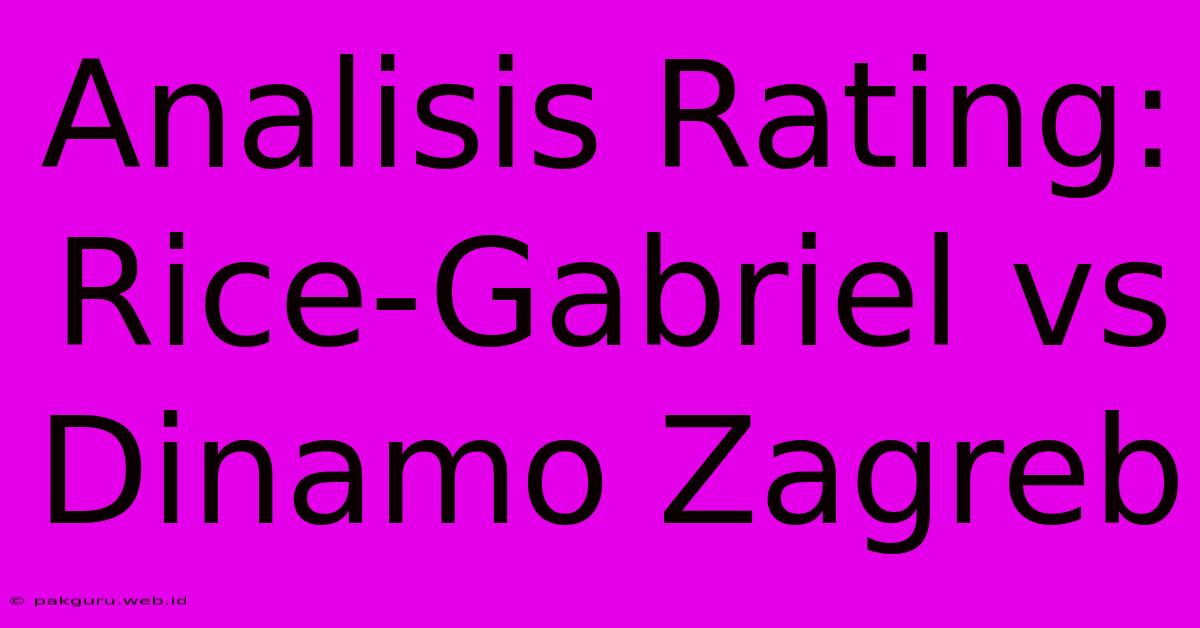Analisis Rating: Rice-Gabriel Vs Dinamo Zagreb

Discover more detailed and exciting information on our website. Click the link below to start your adventure: Visit Best Website wanagama.com. Don't miss out!
Table of Contents
Analisis Rating: Rice-Gabriel vs Dinamo Zagreb
The UEFA Champions League group stage threw up some fascinating matchups, and Arsenal's clash against Dinamo Zagreb was no exception. While the Gunners ultimately secured a victory, the performance of key midfielders Declan Rice and Gabriel Martinelli sparked debate amongst fans and analysts alike. This analysis delves into their individual contributions, comparing their ratings across various reputable sources and exploring the factors influencing their performances.
Declan Rice: A Commanding Presence?
Declan Rice, Arsenal's record signing, was expected to anchor the midfield and dictate the tempo. His performance, however, received mixed reviews. While some sources lauded his defensive contributions, highlighting his tackles, interceptions, and ability to break up play, others criticized his distribution and lack of impact in the attacking third.
Rating Discrepancies Explained:
- High Ratings (e.g., 7.5/10): These often cite his defensive solidity, praising his ability to shield the backline and win back possession in crucial moments. His physical presence and tactical awareness were also highlighted.
- Lower Ratings (e.g., 6.5/10): These pointed to a lack of creativity in his passing, a tendency to play safe passes, and limited involvement in Arsenal's attacking moves. His occasional misplaced passes were also noted.
Key Factors Influencing Rice's Rating:
- Opponent's Tactics: Dinamo Zagreb employed a compact defensive strategy, making it difficult for Rice to find space and influence the game offensively.
- Team Dynamics: Arsenal's overall attacking fluidity impacted Rice's involvement. A more fluid attacking approach might have provided him with more opportunities.
- Individual Expectations: The high price tag and immense expectation surrounding Rice naturally placed extra scrutiny on his performance.
Gabriel Martinelli: A Flash of Brilliance?
Gabriel Martinelli, on the other hand, offered a more consistent and exciting display. His pace, directness, and willingness to take on defenders were key features of his performance. While he didn't find the back of the net, his contributions were vital in Arsenal's attacking approach.
Rating Consistency:
Martinelli's ratings generally fell within a narrower range, indicating a greater consensus on his performance. Most sources awarded him a rating in the 7-8 range.
Key Factors Contributing to Martinelli's Higher Rating:
- Attacking Threat: His constant runs and dribbles created space and stretched the Dinamo Zagreb defense.
- Key Passes: Despite not scoring, Martinelli provided key passes that led to chances for his teammates.
- Work Rate: His tireless pressing and defensive contributions off the ball contributed significantly to Arsenal's overall performance.
Comparing Rice and Martinelli: A Holistic View
While both players contributed to the victory, their performances differed significantly in style and impact. Rice offered a more defensive-minded display, focused on solidity and control. Martinelli, in contrast, was more dynamic and impactful in the attacking phase. Analyzing their ratings highlights the importance of considering different aspects of a player's game rather than relying solely on a single numerical score. A holistic approach, encompassing defensive contributions, creativity, and attacking threat, offers a more comprehensive evaluation.
Conclusion: Beyond the Numbers
The rating discrepancies for Rice and Martinelli serve as a reminder that football analysis extends beyond simple numerical scores. Context, individual roles, and team dynamics must be considered to understand a player's performance fully. While numerical ratings offer a snapshot, deeper analysis helps paint a more complete picture. This match showcased the contrasting styles and contributions of two key players, highlighting the complexity of evaluating individual performances within a team context. Future performances will be crucial in determining their long-term impact and solidifying their roles within the Arsenal squad. Furthermore, how they adapt to future opponents' strategies will be a key factor in shaping future assessments.

Thank you for visiting our website wich cover about Analisis Rating: Rice-Gabriel Vs Dinamo Zagreb. We hope the information provided has been useful to you. Feel free to contact us if you have any questions or need further assistance. See you next time and dont miss to bookmark.
Featured Posts
-
Kapan Pendaftaran Ppg Prajabatan 2025
Jan 23, 2025
-
Harga Samsung Galaxy S25 Series Resmi
Jan 23, 2025
-
Besiktas Menang Solskjaer Sukses
Jan 23, 2025
-
Nonton Ac Milan Vs Girona Live Streaming
Jan 23, 2025
-
Dominasi Shakhtar Singkirkan Brest 2 0
Jan 23, 2025
